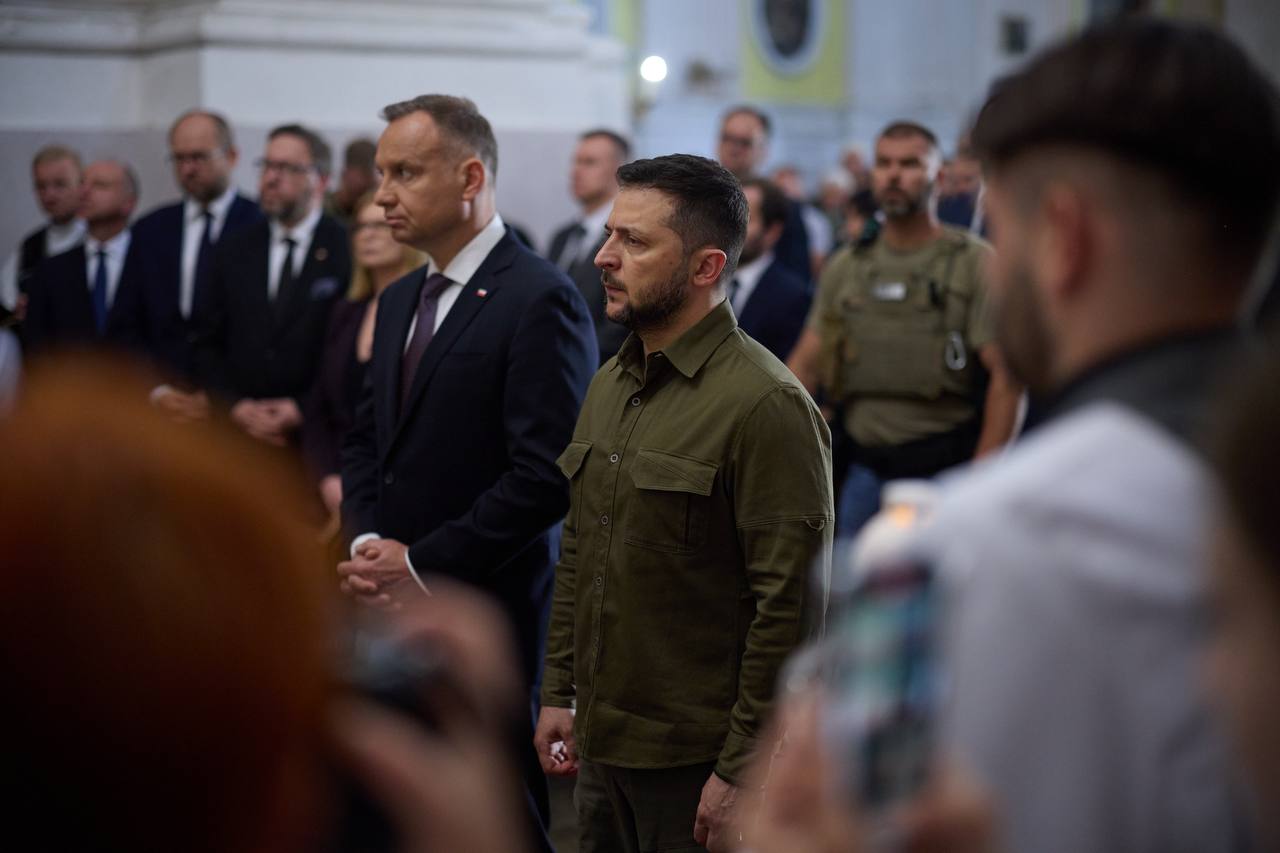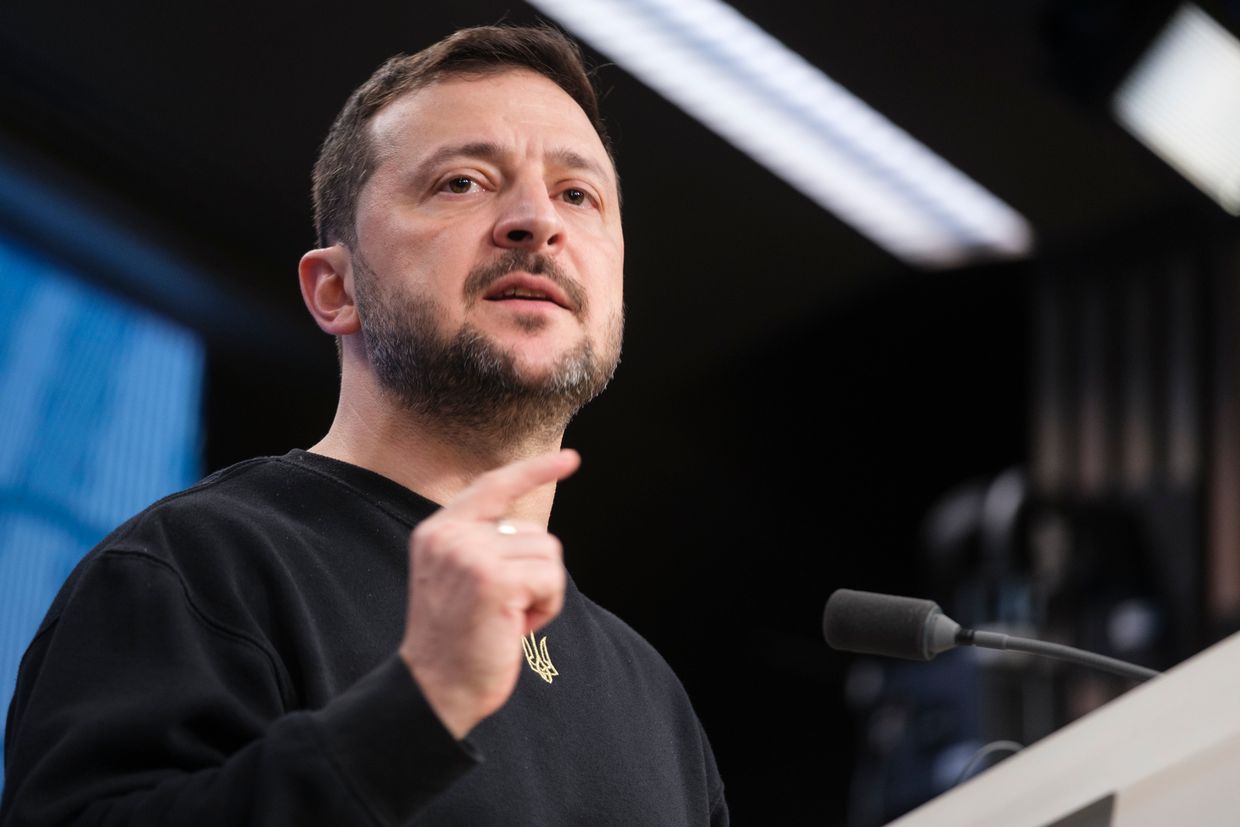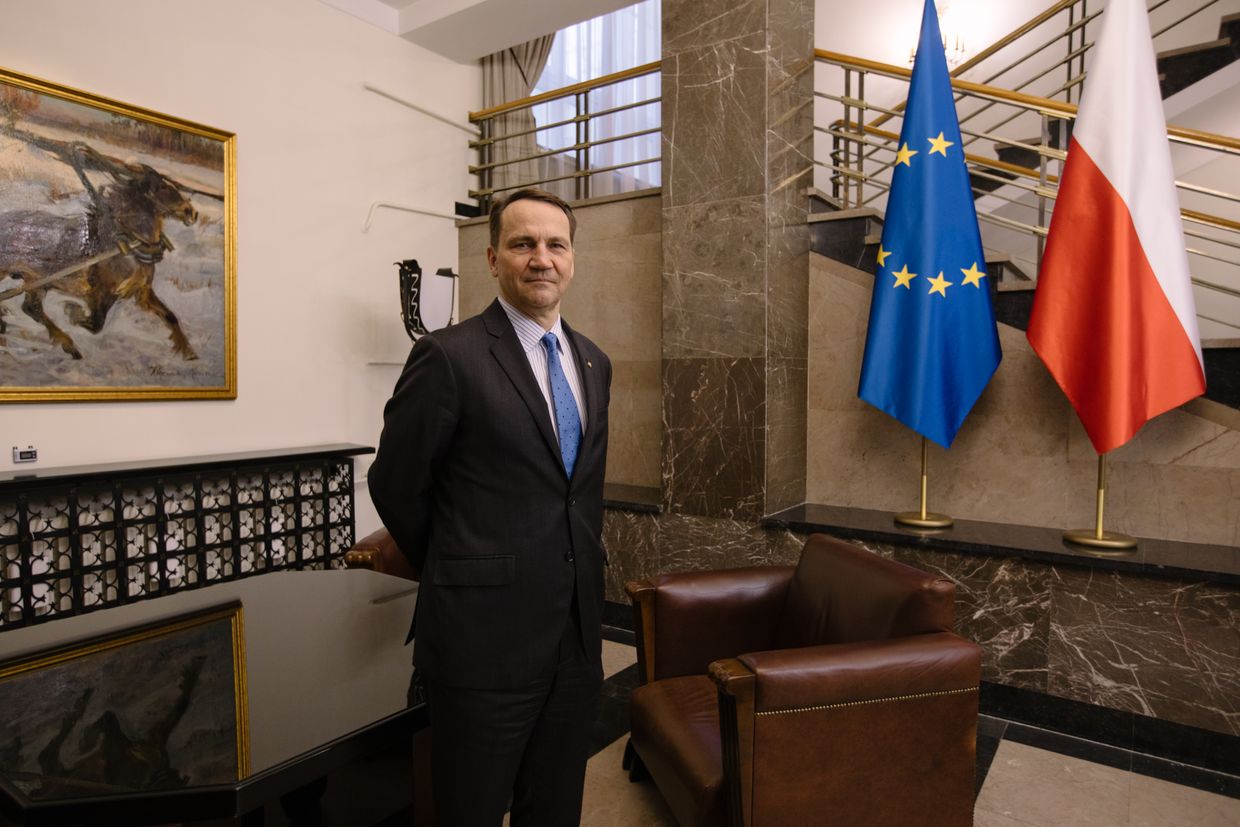'Negotiations are dictated on the battlefield' — Polish envoy on Russia-Ukraine war

Piotr Leszek Łukasiewicz, chargé d'affaires to Ukraine. (Wikimedia)
Editor’s note: The transcript of this interview has been edited for length and clarity.
Poland holds a special position among Kyiv's partners — with a shared history of Russian oppression and conquest, its leaders have left no room for doubt that the full-scale invasion of Ukraine represented an existential threat to the region and Europe as a whole.
Poland has sent tanks, fighter jets, artillery, and more to boost Ukrainian defenders fighting Russian forces, while the country has opened its doors to nearly 2 million Ukrainian refugees since 2022.
Yet Poland's support for Ukraine's fight against Russia has also been marked by tensions, sparked both by historical grievances and modern political and economic factors.
The ongoing dispute centered on the World War II-era Volyn massacres by the Ukrainian Insurgent Army of Poles living in what is today western Ukraine and subsequent reprisals. And economic disputes, such as protests by Polish farmers against Ukrainian grain, further complicate ties as Kyiv seeks entry to the EU and the single European market.
The Kyiv Independent sat down with Poland's charge d'affaires in Kyiv, Piotr Lukasiewicz, on Jan. 29 to discuss why Poland stands out among Ukraine's partners, how to approach the most painful chapters of the shared Polish-Ukrainian history, and why it may be too early to discuss a ceasefire in Ukraine.
The Kyiv Independent: Since the outbreak of the first invasion, Poland has been one of the most vocal supporters of Ukraine. How has Poland been irreplaceable as an ally?
Piotr Lukasiewicz: Four hundred tanks, several hundred APCs (armored personnel carriers), including the modern ones, artillery, spare parts, hundreds of tons of ammunition, thousands of tons of humanitarian and other equipment, military and civilian.
The Kyiv Independent: How can we reconcile the fact that Ukraine and Poland have been close allies but also had many heated disputes, even emotional exchanges between Polish and Ukrainian leaders, during the war?
Piotr Lukasiewicz: Since we are neighbors, we have our good times and bad times. And such close nations have these ebbs and flows of relations and attitudes.
The strategic message from us is that we are here to support Ukraine rather than go back to political and historical discussions from the past. Of course, they are very important to the identity of Ukrainians and Poles. And they have to be somehow resolved, which is happening. The resolution of these disputes is happening as we speak, and I'm happy to report progress on both sides, progress in terms of attitude.
People are expecting some form of breakthrough, some form of symbolic act of reconciliation. But these very rarely happen between the nations of Europe. It is a period of reconciliation, rather than an act of reconciliation. It is progress that we call the European Union.

The Kyiv Independent: Are you worried that these underlying issues, such as historical and economic disputes, could undermine Poland's military and security support for Ukraine or, as you call it, this strategic interest?
Piotr Lukasiewicz: When historians and specialists gather in Lviv, Kyiv, Warsaw, and Krakow, when Polish leaders come to Ukraine, or Ukrainian leaders go to Poland, and even touch upon the question of history and the troubles from the past, almost in the same sentence they say that if we argue, if we have this heated discussion that prevents us from doing something more, the only one who benefits is Russia.
Russia is using its hybrid, information, and malicious influence, both here in Ukraine and Poland, to use this debate to its own benefit. If we turn it into something political, only Russia would benefit.
We can always argue about this place or another place, about this number of people killed here, the number of people killed there. This is a matter for serious discussion, and it's happening.
The Kyiv Independent: Just to clarify, we're talking about Volyn massacres and the victims' exhumations (in Ukraine).
Piotr Lukasiewicz: We are talking about the victims, yes.
The Kyiv Independent: You spoke against politicizing the Volyn massacres. How would you respond to voices in Ukraine who say that Poland itself is politicizing the issue by linking it to Ukraine's efforts to join the EU? Several politicians have said that Ukraine will not be able to join the EU unless the Volyn issue is settled.
Piotr Lukasiewicz: So there are narratives on both sides. But there are facts on the ground that are moving this process towards a good resolution. What else can I say? Of course, I won't comment on this politician or another to say whether (what they have said) is true or not.
The second thing is that EU accession talks are not conditioned on individual bilateral relations between countries with the candidate states. This applies not only to Ukraine but also to Moldova, the western Balkans, and others. It is merit-based.
The European Union is a collection of national interests. So, we are conducting these negotiations with Ukraine with our national interests in mind. But it's very important to understand — for Ukrainians especially — that the process is not a Polish-Ukrainian one. It's a process (involving) all member states.

The Kyiv Independent: There are still many historical topics that are viewed very differently in Poland and Ukraine, such as Stepan Bandera, the Ukrainian Insurgent Army, or its commander, Roman Shukhevych. Do you expect that these topics will continue to strain Polish-Ukrainian relations and hinder Ukraine's effort to join the EU?
Piotr Lukasiewicz: As is mentioned in many books, including (Timothy) Snyder's Bloodlands, Polish and Ukrainian history is full of blood, tragedy, and crimes committed against each other.
You mentioned names that sound tragic in Polish history and our understanding of our identity. We are not going to pay respect to these names, but we can't really influence what Ukrainians think. We are not going to choose heroes for neighboring nations.
"Russia is not threatening only Ukraine, or only Polish independence, or Latvian, Lithuanian, or Estonian independence. They are collectively threatening Europe as a whole rather than our own particular, individual identity."
But it's very important for me and the Polish people, Polish historians, and Polish politicians that what is happening now, in the last 12 years of the Ukrainian struggle against the Russian empire, is that these times are producing greater, better, more suitable heroes for Ukrainian identity.
If you look at our embassy here in Kyiv, you will notice the pictures of Ukrainian soldiers with Polish roots. These are Poles living here in Ukraine who resisted the Russian invasion during the last 12 years.
For me, these are true heroes. I can relate to, and understand them. I'm Polish, they were Polish-Ukrainian. I'm not advising Ukrainians to build their history only on them. But their examples, their beautiful faces, which are shown at our embassy… there you can say: "These are the heroes that we can build our friendly relations upon."
These are the people who are fighting for modern Ukraine, not for Ukraine as it was 100 or 70 years ago. They are future-oriented heroes rather than heroes who wrote many, many ugly things in the past.
If Ukrainian society is trying to understand or is searching for a national example in history, it should also look at what happened between Poles and Germans, between French and Germans, and between many nations and how they reconciled. This was based on European values of reconciliation — European Union values. This should be future-oriented rather than expressing the sole identity of a particular nation.
Russia is not threatening only Ukraine, or only Polish independence, or Latvian, Lithuanian, or Estonian independence. They are collectively threatening Europe as a whole rather than our own particular, individual identity.
The Kyiv Independent: Poland took over the rotating presidency of the Council of the EU this January with the promise to help Ukraine speed up the accession process. What steps can Poland take in this regard?
Piotr Lukasiewicz: First, you should remember that the presidency of the EU Council is not what it used to be. It is a management rather than a leadership position.
But what we can do is that we can speed up the discussion. For instance, the opening of so-called clusters or chapters of negotiations is a process of three or four steps — accepting the screening report, issuing the benchmarks, and then starting negotiations.
So there are three or four steps that we can speed up during these six months, to maintain the Ukrainian agenda at the highest possible level, conduct very professional, merit-based, but still fast negotiations. And we are seeing great will from the Ukrainian side to speed up this process.
We are working to achieve the unanimity of the votes among the representatives of the member states in Brussels. And we are quite optimistic in delivering this first chapter, the so-called fundamentals, in the next two or three months.
Second, Poland had its own history of accession. We are very similar to Ukraine in terms of size, demographics, and type of economy. During our presidency, we want to share the best experiences, practices, and lessons learned by Polish negotiators.
The Kyiv Independent: What do you see as the main obstacles to Ukraine's EU accession efforts?
Piotr Lukasiewicz: It's the particular interests of the member states that can be driven by individual interests rather than strategic interests in mind. The strategic interest of the EU as a whole is Ukraine as a free and democratic member in, hopefully, the best and fastest possible way.
The Kyiv Independent: But looking from the perspective of Poland specifically, are you, for example, worried about accepting Ukraine into a single European market? We saw the mass protests and border blockades that came as a result of Ukrainian agricultural imports.
Piotr Lukasiewicz: You are asking about Poland's particular interest, which I'm trying to put into a different perspective. It's a collective negotiation of all member states rather than just Poland and Ukraine.
When we were entering the European market, we had this period of delay in particular sectors of the economy. In the first period of our membership, the farmers were paid both by the EU and our government. I remember very well the Polish lessons, a kind of disillusionment when several member states in 2000, 2002, and 2003 were voicing the same thing you asked — how the Polish accession to Europe would change the agricultural market further west in France or Spain?
Every nation has its own agricultural or economic interests. This is the experience we should pass on to Ukrainians so they can understand how they have to adapt to the common market, and how they have to change their structure, transportation policy, and agricultural infrastructure.
What we are trying to do for Ukraine is help them understand that it's not Poland that is particularly blocking something. It's a collection of the national interests of other member states as well.
We also have to adapt to this changing market. But the Polish example is that since we joined the European market with all the obstacles I mentioned, our GDP has grown almost by 300%. After 20 years, we are three times richer than we were when we entered.
This is an example that Ukrainians should consider. It is not a threat to them or to us. It's rather a question of adapting to new economic realities.
The Kyiv Independent: With the start of the U.S. presidency of Donald Trump, there are expectations that Europe should take greater responsibility for helping Ukraine resist Russian aggression and for ensuring the security of Europe as a whole. What role can Poland, as one of the most powerful militaries on the continent, play in this regard?
Piotr Lukasiewicz: I'm in a very privileged position among the ambassadors here in Kyiv to say that we are actually answering the calls to spend much more on defense. Everywhere you go, Poland is being given as an example of how to spend, what to spend, and how much to spend on defense.
Of course, we cannot sit back and say: "Okay, we achieved 5% (of GDP on defense spending), we are done." So we are calling on other nations that are lagging behind with this expenditure.
Secondly, given the importance of the Polish geographical position vis-a-vis Ukraine, we notice a much greater interest from our Central European and Nordic allies to gather around the example of Poland and the necessity to work together. I'm talking about these northern formats organized by the Polish government this year. The second format is the so-called Weimar Plus with France, Germany, and Poland being the core. And plus several other nations, the so-called big European five.
The Kyiv Independent: One hotly debated subject recently was the possibility of deploying European peacekeepers to monitor a potential ceasefire deal in Ukraine. What is Poland's position toward this idea?
Piotr Lukasiewicz: A very clear position.
There is no description of such a mission. There is no definition of such a mission. If there is a ceasefire, hopefully with the best Ukrainian position, then we will talk about a future peacekeeping contingent or not.
It very much depends on what will be achieved on the front lines. We are focusing right now not on discussing possible scenarios of the future, but rather on how to support Ukraine here and now.

The Kyiv Independent: How would you describe a successful and strong ceasefire deal?
Piotr Lukasiewicz: A ceasefire can take many forms. Over the past 12 years, we have observed how the ceasefire between Russia and Ukraine looked, how it was immediately broken by Russia after the first phase of the war in 2014, and how Russia committed itself to gradually invading more and more.
It is a rather baseless discussion right now about what (the ceasefire) would look like. What we have now is a heroic defense of Ukraine with the capabilities they have, which we are trying to strengthen.
It is the basic knowledge that peace negotiations should be conducted from a position of strength. And we are helping Ukraine to achieve the best achievable position in these future talks.
The second thing is that we cannot adopt the kind of mental position that Russia is enforcing something. We should be speaking from a position of strength — we are 10 times bigger in the sense of military, economy, and many advantages Europe has over Russia. It is us who should be imposing our conditions on Russia and imposing our threats on the Russian economy.
The Kyiv Independent: What should be non-negotiable in possible talks with Russia? For example, Russia recently declared that it will insist on barring Ukraine from entering NATO.
Piotr Lukasiewicz: The negotiations are dictated by the battlefield. This is war, not a political process. And the war changes a lot on a monthly basis. So we should not talk about the politics of how we should communicate with Russia, but rather achieve a reality on the ground that would serve political and diplomatic messages, with Ukraine being a leader or an actor in it.
Putin wants… to have one partner, one of the big global powers, so he can be again seen as a global leader. And we are in the same basket with the Ukrainians, the Czechs, the Germans, and others being talked over our heads, about our agency, existence, and well-being.
So, the basic condition for us, as for many Europeans, is strengthening Ukraine and then being part of the scenario or architecture in the future.
Note from the author:
Hi, this is Martin Fornusek. I hope you enjoyed this interview.
Our team strives to bring you the most interesting discussions with politicians, experts, and other important voices with insights on Ukraine's history, politics, and its resistance against Russian aggression.
We wouldn't be able to do so without the support of readers like you. To help us continue in this work, please consider becoming a member of the Kyiv Independent's community.
Thank you very much.













